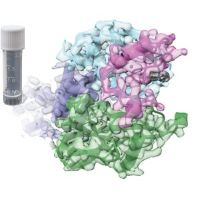Specification
| Description | Recombinant protein from the full-length sequence of homo sapiens indoleamine 2,3-dioxygenase 1 (IDO1) (NM_002164). |
| Organism | Homo sapiens (Human) |
| Expression Host | Human Cells |
| Tag Info | His or DYKDDDDK. Please contact us if you need further information or require specific designed tag. |
| Purity | Greater than 90% by SDS-PAGE gel |
| Uniprot ID | P14902 |
| Entry Name | I23O1_HUMAN |
| Gene Names | IDO1 IDO INDO |
| Alternative Gene Names | IDO INDO |
| Alternative Protein Names | Indoleamine 2,3-dioxygenase 1 (IDO-1) (EC 1.13.11.52) (Indoleamine-pyrrole 2,3-dioxygenase) |
| Application | Antigens, Western, ELISA and other in vitro binding or in vivo functional assays, and protein-protein interaction studies; For research & development use only! |
| Buffer | Purified protein formulated in a sterile solution of PBS buffer, pH7.2, without any preservatives |
| Endotoxin | Endotoxin level is < 0.1 ng/µg of protein (<1EU /µg) |
| Length | 403 |
| Molecular Weight(Da) | 45326 |
| Protein Sequence | (The sequence of expressed protein may have some variation from the sequence shown below. Please contact us for the exact sequence.) MAHAMENSWTISKEYHIDEEVGFALPNPQENLPDFYNDWMFIAKHLPDLIESGQLRERVEKLNMLSIDHLTDHKSQRLARLVLGCITMAYVWGKGHGDVRKVLPRNIAVPYCQLSKKLELPPILVYADCVLANWKKKDPNKPLTYENMDVLFSFRDGDCSKGFFLVSLLVEIAAASAIKVIPTVFKAMQMQERDTLLKALLEIASCLEKALQVFHQIHDHVNPKAFFSVLRIYLSGWKGNPQLSDGLVYEGFWEDPKEFAGGSAGQSSVFQCFDVLLGIQQTAGGGHAAQFLQDMRRYMPPAHRNFLCSLESNPSVREFVLSKGDAGLREAYDACVKALVSLRSYHLQIVTKYILIPASQQPKENKTSEDPSKLEAKGTGGTDLMNFLKTVRSTTEKSLLKEG |
Background
| Function | FUNCTION: Catalyzes the first and rate limiting step of the catabolism of the essential amino acid tryptophan along the kynurenine pathway (PubMed:17671174). Involved in the peripheral immune tolerance, contributing to maintain homeostasis by preventing autoimmunity or immunopathology that would result from uncontrolled and overreacting immune responses (PubMed:25691885). Tryptophan shortage inhibits T lymphocytes division and accumulation of tryptophan catabolites induces T-cell apoptosis and differentiation of regulatory T-cells (PubMed:25691885). Acts as a suppressor of anti-tumor immunity (PubMed:23103127, PubMed:25157255, PubMed:14502282, PubMed:25691885). Limits the growth of intracellular pathogens by depriving tryptophan (PubMed:25691885). Protects the fetus from maternal immune rejection (PubMed:25691885). {ECO:0000269|PubMed:14502282, ECO:0000269|PubMed:17671174, ECO:0000303|PubMed:23103127, ECO:0000303|PubMed:25157255, ECO:0000303|PubMed:25691885}. |
| Pathway | Amino-acid degradation; L-tryptophan degradation via kynurenine pathway; L-kynurenine from L-tryptophan: step 1/2. |
| Protein Families | Indoleamine 2,3-dioxygenase family |
| Tissue Specificity | Expressed in mature dendritic cells located in lymphoid organs (including lymph nodes, spleen, tonsils, Peyers's patches, the gut lamina propria, and the thymic medulla), in some epithelial cells of the female genital tract, as well as in endothelial cells of term placenta and in lung parenchyma (PubMed:25691885). Weakly or not expressed in most normal tissues, but mostly inducible in most tissues (PubMed:25691885). Expressed in more than 50% of tumors, either by tumoral, stromal, or endothelial cells (expression in tumor is associated with a worse clinical outcome) (PubMed:18418598). Not overexpressed in tumor-draining lymph nodes (PubMed:26155395, PubMed:25691885). {ECO:0000269|PubMed:18418598, ECO:0000269|PubMed:25691885, ECO:0000269|PubMed:26155395}. |
QC Data
| Note | Please contact us for QC Data |
| Product Image (Reference Only) |  |

